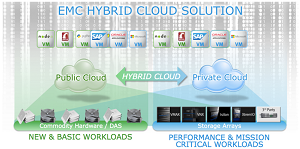News
EMC Combines Benefits of Public and Private Clouds
Hybrid Cloud solution and Elastic Cloud Storage Appliance announced.
EMC Corp. announced several products at its Las Vegas conference with the theme of combining the benefits of public and private clouds for enterprises.
The company said customers can easily build a hybrid cloud that combines the best aspects of public and private clouds by using the EMC Hybrid Cloud solution. EMC said public cloud services are known for speed and agility, while private clouds feature control and security.
"The EMC Hybrid Cloud solution is a new end-to-end reference architecture that is built upon EMC's industry-leading private cloud solutions," the company said. "It allows customers to rapidly integrate with multiple public clouds to create a unified hybrid cloud. The solution enhances the performance, security and compliance of an organization's private cloud with compatible, on-demand services from EMC-powered cloud service providers."
EMC executive Josh Kahn said the solution is built on the software-defined foundation established by EMC and VMware. "On one hand, the EMC Hybrid Cloud solution is the foundation of the hybrid cloud, enabling application workloads to be placed in the right cloud, with the appropriate cost, security and performance needed," Kahn said. "On the other hand, EMC Hybrid Cloud is the bridge between traditional applications and next-generation applications, all deployable across a common software-defined architecture."
While virtualization solutions provided cost savings and agility, customers asked for more, such as a choice of what devices to use, better access to infrastructure and applications, and application flexibility. Providing those benefits entails what EMC calls a "well-run Hybrid Cloud," something that more than 70 percent of customers indicated they will need, Kahn said.
EMC sought to show how easy it is to build such hybrid clouds by having its staffers build one from scratch in 48 hours at the EMC World conference.
Echoing the same public/private cloud theme was the announcement of the EMC Elastic Cloud Storage (ECS) Appliance. "The new EMC ECS Appliance delivers the ease-of-use and agility of a public cloud with the control and security of a private cloud," the company said.
Formerly called Project Nile, the ECS Appliance is described as an infrastructure for hyperscale cloud storage. It provides up to 2.9 petabytes of storage in a single rack and can be clustered to gain exabyte scale.
 [Click on image for larger view.] The EMC hybrid cloud vision(source: EMC Corp.)
[Click on image for larger view.] The EMC hybrid cloud vision(source: EMC Corp.)
In his Virtual Geek blog, EMC's Chad Sakac claimed the new appliance delivered better transactional storage and object data services than comparable solutions offered by competitor Amazon Web Services.
Sakac also said the appliance features the same intellectual property as yet another product announced at the conference: ViPR 2.0, a software-defined storage offering. He said the ViPR Controller and ViPR Data Services are software-only and appeal to customers who want to use their own hardware, while the ECS Appliance is for customers who "want to avoid the mess of hardware sourcing, sparing and maintenance."
David Goulden, CEO of EMC Information Infrastructure, positioned the new products as solutions for problems faced in the new age of mobile workers and customers, social media engagement, Big Data, and, of course, cloud computing.
"The industry is navigating the single-most transformative IT shift ever," Goulden said. "It's driven by billions of devices, billions of users and millions of applications. Not a single industry or organization is immune to this sweeping change. The priority for customers today is to drive competitive advantage by harnessing the forces of mobile, social, cloud and Big Data, while maximizing existing investments that support traditional enterprise workloads. The hybrid cloud model allows customers to run applications easily and cost-effectively inside or outside of their data centers, and today's software-defined products make this possible."
About the Author
David Ramel is an editor and writer at Converge 360.